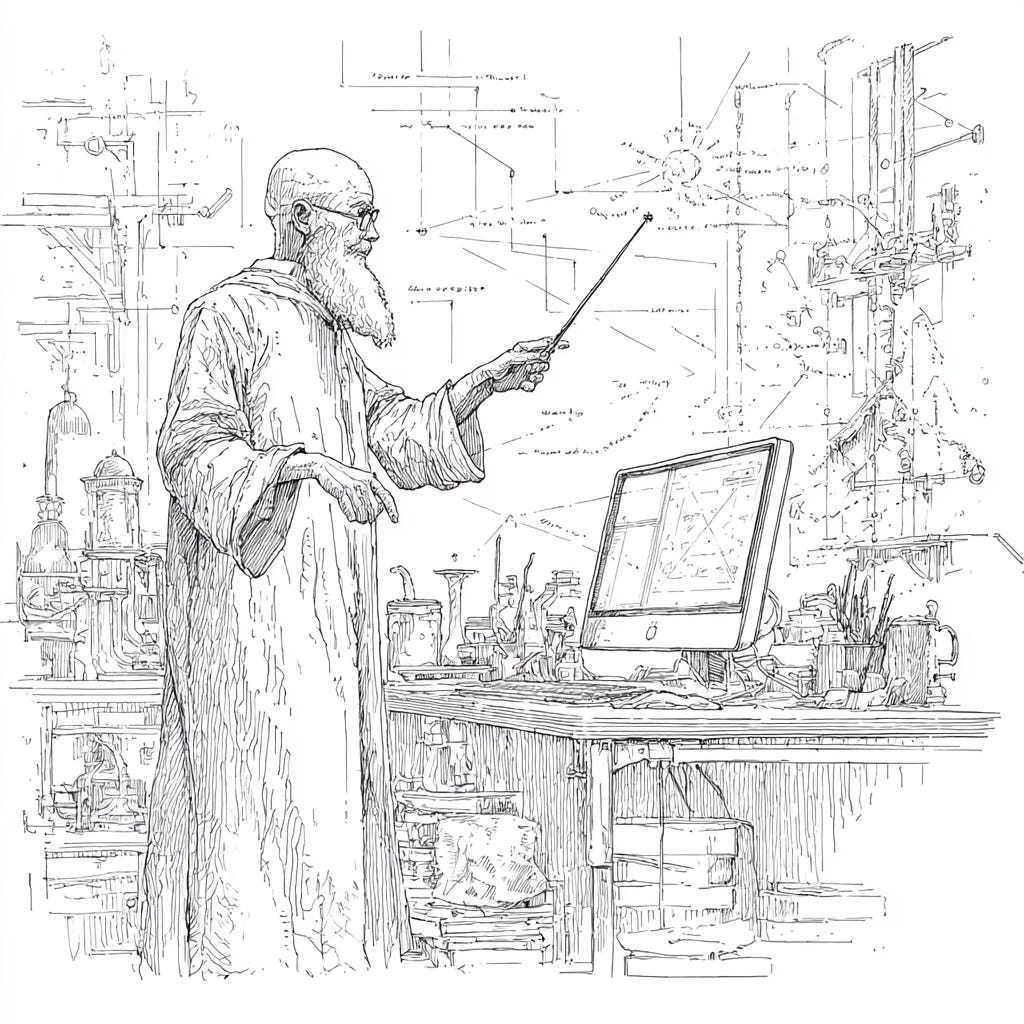What Sort of Magic?
New Artisans and Technology.
“Any sufficiently advanced technology is indistinguishable from magic”
Arthur C Clarke.
Consider for a moment the various forms of magic. Firstly, show business magic, where the art is in stagecraft. It’s about safe astonishment that your audience can watch from their comfortable seat. It’s about spectacle without upheaval. Grabbing people’s attention and bringing them into your orbit, so that you can sell to them. Then there’s Alchemical magic. A profound psychological shift that disrupts perceptions, alters paradigms, and prompts us to reconsider our approach to things. Lastly, there is what I think of as “system magic” - the way our environments change in response to us in ways we do not anticipate.
In his excellent book, “Entangled Life”, Merlin Sheldrake tells a story about David Abram doing close-up magic in a café. What mattered wasn’t the coin trick itself but what happened after. People walked outside and said the sky looked bluer, the streetlamps brighter, even strangers’ faces more vivid. Abram’s point was that magic works in the blind spots of our expectations. It loosens the grip of what we assume, and for a moment, we fall back on our senses. It’s the kind of magic that lasts; it leaves a residue. Cognitive science has a language for this now: we run on expectations, and when they’re disrupted, the world can feel anew. Awe, psychedelics, even a good trick of attention, do the same thing. Most corporate “magic shows” don’t touch this. They sparkle in the moment, but by the next morning, nothing looks different. When you watch a magician, the real trick isn’t the coin or the card; it’s your own expectations being pulled out from under you. The surprise leaves you off balance, and sometimes the effect lingers. System magic is another stage removed; it is the magic we deny, then try to control, then have to adapt to. Gandhi understood system magic:
“First they ignore you, then they laugh at you, then they fight you, then you win.”
―Mahatma Gandhi
Technology often fails to help us address the need for change; instead, it seeks to insulate us from it through digital pain relievers, rather than addressing the root causes.
The magic of technology is different.
For all its impact, its promise isn’t surprise but control; the thrill of smoothness, of a command obeyed. The psychology is almost opposite to awe. Magic unsettles you and leaves a story you retell. Technology reassures you and slips into routine until the wonder fades. Both capture attention, but whilst one can leave you unsettled and curious, the other entertains and coddles you until you accept it as reality. The first provokes, the other anaesthetises.
Coming back to the different sorts of magic: Technology as alchemy (which I’ll come back to). Technology as showbiz magic. And technology as commodity magic. Today, most of our technology is showbiz magic. It entertains and distracts us. It’s a safe thrill without any real change. It serves the organisation’s desire to control narrative or culture and offers a spectacle, impressive, but it’s external. It offers temporary amazement through a stage magician. In many ways, it’s a branch of marketing, a Penn and Teller sort of magic; slick, professional, and commercial with no lasting benefit.
This is the magic behind AI, and the very lifeblood of the valuations it is being given. Its trick is to commoditise our relationship with change, reduce our need to think, and our need for those who do it. The trouble is, it produces nothing new, just more and more variations of what we already know. It’s an express train to what Cory Doctorow calls enshittification, the path to downstream subscription traps, microtransactions, surveillance AI, employee monitoring, data monetisation, and the rest.
But let me come back to technology and alchemy. The transformation of the self, particularly in our understanding of the situation, by increasing our capacity, creativity, and agency. It serves the individual by expanding craft, learning, and growth. It feels like a magic wand amplifying what we can do and become. It sharpens our awareness, skills, and sense of possibility. This is magic as Merlin, as an initiator. My friend Steve Done refers to it as AI whispering, and I like that description.
For a new artisan, perhaps the only test worth applying is this: does our relationship with technology change how we see things and inspire those we work with to achieve greater things? If the answer is yes, that’s the alchemy of the artisan. If no, it’s just a franchised trick, borrowed from the latest offering on LinkedIn.
There is a magician and an alchemist in every one of us. We all see the world differently, have different thoughts and ideas. We carry inside us a dream of what we might be, what we might do, how we might change things.
Technology does not invoke human wonder, and wonder is at the core of what it means to be human. Wonder is not just for children, because we still carry the child inside of us.
Loris Malaguzzi, the founder of the Reggio Emilia approach to early years education, captured it beautifully in his poem:
The Hundred Languages of Children
The child
is made of one hundred.
The child has
a hundred languages
a hundred hands
a hundred thoughts
a hundred ways of thinking
of playing, of speaking.
A hundred always a hundred
ways of listening
of marveling of loving
a hundred joys
for singing and understanding
a hundred worlds
to discover
a hundred worlds
to invent
a hundred worlds
to dream.
The child has
a hundred languages
(and a hundred hundred hundred more)
but they steal ninety-nine.
The school and the culture
separate the head from the body.
They tell the child:
to think without hands
to do without head
to listen and not to speak
to understand without joy
to love and to marvel
only at Easter and Christmas.
They tell the child:
to discover the world already there
and of the hundred
they steal ninety-nine.
They tell the child:
that work and play
reality and fantasy
science and imagination
sky and earth
reason and dream
are things
that do not belong together.
And thus they tell the child
that the hundred is not there.
The child says:
No way. The hundred is there.
Loris Malaguzzi (translated by Lella Gandini)
We can use technologies, and AI in particular, to think without hands, to do without head, to listen and not to speak and to understand without joy. We can instil processes that insist work and play, reality and fantasy, science and imagination, sky and earth, reason and dream are things that do not belong together. But like the child, the New Artisan knows differently.
And that, I believe, encapsulates the task before us. Even as we work in organisational cultures that ask us to love and to marvel only at Easter and Christmas and discover the world already there, we must find space to occupy the spaces technology never will.
Wonder is not a function of logic. It is something altogether more mystical, something altogether more alchemical.
Which is why today sees the launch of an idea. A place to meet and work together, with and without technology, to deliver the things that we can, and it cannot.
A short word on why I am doing this. Firstly, what it isn’t. It’s not a business idea. It’s not a programme. It’s not about making money. However, I do hope to cover my costs. It is a space without a defined agenda, without expectations or goals. It is, I hope, a space for wonder, for those who have half an idea that they want to play with, and in the company of others, to find space to do so.
“I am sure there is Magic in everything, only we have not sense enough to get hold of it and make it do things for us” Frances Hodgson Burnett. The Secret Garden.
I am doing it because I am both frustrated and excited by the amount of talent, potential, and ideas I see going to waste inside organisations that are predicated on efficiency and productivity. It seems clear that our organisations are not going to change as fast as the environment around them requires. As in the case of capital, we will privatise the gains that technology offers and socialise the risks.
The paradox is that in a business world of short-term thinking, we are both the likely collateral damage as balance sheets are protected, and the most likely source of the healthy growth we need. It means that there is a need for us to reappraise our relationship with organisations, recover our sense of agency, and the power it holds for us.
In many respects (if I’m honest, a few more than many), I am not ready to start, but since I cannot wait until I am, I feel I must.
The Athanor
The athanor, the furnace of the alchemists, was never about speed or spectacle. It was built to hold a steady flame, a quiet fire that could burn for weeks without faltering. In it, substances softened, mingled, and slowly became something new. For the alchemist, the athanor was as much a mirror of the soul as a piece of equipment: a reminder that true transformation comes not from flashes of brilliance but from constancy, patience, and faith in unseen processes.
The athanor sits on the boundary between what is disappearing and what is emerging. It is a temporary, yet necessary space where new artisans can develop their best work, away from the demands of scale and efficiency.
It’s for those who inspire those we work with to achieve greater things by invoking the alchemy of the artisan. I want to spend October shaping it, with your help, into something quietly transformative, for those who are no longer willing to be an audience at a magic show, and would rather create magic of their own. You will gain an initial understanding of what this is about by visiting the site, and I will post updates there on a regular basis throughout October, followed by the launch. It would be great to have you along.
“Whatever you can do or dream you can, begin it. Boldness has genius, power and magic in it.”
Goethe.



